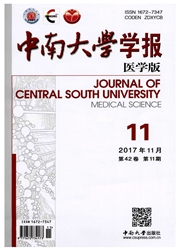

 中文摘要:
中文摘要:
目的:研究母爱剥夺是否诱发成年大鼠抑郁样行为表现,miR-16是否参与母爱剥夺诱发抑郁的病理过程。方法:在SD大鼠出生后第1天按窝随机分为母爱剥夺组(n=17)和正常对照组(n=17)。母爱剥夺组大鼠在出生后第1至14天每天接受6 h的母爱剥夺应激,正常对照组大鼠不接受任何实验处理。在大鼠13周龄时采用强迫游泳和糖水偏爱实验评定大鼠的抑郁水平;采用实时荧光定量RT-PCR检测大鼠海马miR-16的表达水平。结果:在强迫游泳实验中,母爱剥夺组大鼠的被动漂浮时间显著长于对照组大鼠,糖水偏爱率显著低于对照组(P〈0.05);与对照组比较,母爱剥夺组大鼠海马内miR-16的表达水平显著增加(P〈0.05),miR-16表达水平与抑郁样行为水平显著相关(P〈0.05)。结论:母爱剥夺能使大鼠成年后表现出抑郁样行为,海马内miR-16表达水平升高,miR-16可能参与母爱剥夺诱发大鼠抑郁样行为的病理过程。
 英文摘要:
英文摘要:
Objective: To detect the expression of miR-16 in the hippocampus of a rat depression model induced by maternal deprivation,and to explore whether miR-16 is involved in the pathological process of maternal deprivation-induced depression.Methods: Newborn SD rats were randomly divided into a maternal deprivation group(n=17) and a control group(n=17).Rats in the maternal deprivation group experienced maternal deprivation for 6 h per day from 1st to 14th postnatal day,while rats in the control group rats received no treatment.When the rats were 13 weeks old,depression-like behaviors were assessed by forced swimming test and sucrose consumption test,and the expression of hippocampal miR-16 in rats was detected by real-time RT-PCR.Results: Maternal-deprived rats exhibited significantly longer passive floating time and lower sucrose preference rate than rats in the control group(P0.05).Maternal-deprivation rats expressed higher level of miR-16 in the hippocampus than rats in the control group,and the expression level of miR-16 was significantly associated with the passive floating time(r=0.65,P0.05) and the sucrosepreference rate(r=–0.59,P0.05).Conclusion: Maternal deprivation can induce depressive behaviors in rats and increase the expression of miR-16 in the hippocampus in rats.MiR-16 may be involved in the pathological mechanism of the maternal deprivation-induced depression.
 同期刊论文项目
同期刊论文项目
 同项目期刊论文
同项目期刊论文
 Hyperthermia protects mice against chronic unpredictable stress-induced anxiety-like behaviour and h
Hyperthermia protects mice against chronic unpredictable stress-induced anxiety-like behaviour and h 期刊信息
期刊信息
